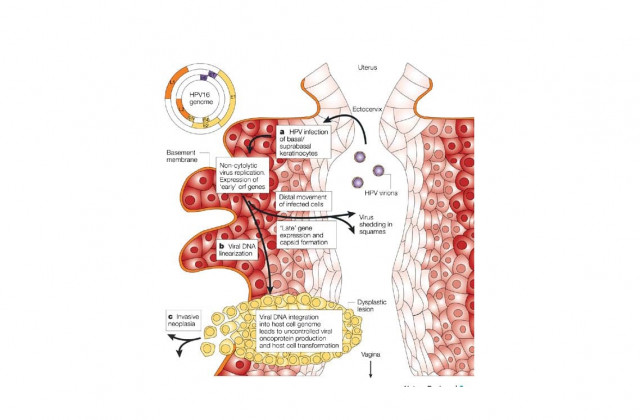Nipping the bug that beds in the womb
Eight to ten women admitted for cervical cancer in JPMC every month according to Dr Shereen Zulfiqar Bhutta.

Nipping the bug that beds in the womb
Also present was the internationally renowned Dr Shereen Zulfiqar Bhutta, head of gynaecology and obstetrics at Jinnah Postgraduate Medical Centre (JPMC). She said up to 10 women a month are admitted there with stage three (with about five years to live) of the cancer with survival chances of about 20 per cent.
What is truly upsetting, according to the doctors, is the easy prevention of the cancer by precaution and proper vaccination. In Asia, 87.3 for every 100,000 women are infected and the mortality rate stands at 55.6 per 100,000, according to Dr Bhutta. Pakistan is currently at grade two (of five) for the risk of cervical cancer, and both Dr Bhurgri and Dr Bhutta agree that the severity is increasing and soon will make its way to grade three.
She advised girls as young as 12 years to get vaccinated. This shores them up against the infection once they do eventually become sexually active. The doctors warned that the repercussions of not being vaccinated can be severe as the intensity of the cancer is higher at a younger age. For example, Dr Bhurgri explained, a 10-year-old girl who doesn’t get vaccinated today might reach grade 5 level of the cancer by the time she is 50 years old.
The infection caused by the Human Papilloma Virus (HPV) is estimated to infect up to 80 per cent of women during their lifetime. The situation is much worse in developing countries which own 75 per cent of the 1.4 million cases worldwide.
One of the reasons for cervical cancer may be having children at a later age. This is supported in part by the statistical prevalence of women from financially deprived backgrounds (27 per cent) compared to the 48.7 per cent from affluent backgrounds.
There are two main prevention measures. One is to simply get vaccinated, preferably prior to the first sexual experience which would just nip the infection in the bud before it develops into cancer. Second is constantly to get screened to detect the infection or initial stages of cancer. Women who get screened every year have a 93 per cent chance of prevention, for every three years the percentage drops to 91 and for those who screen every five years drops further to 84 per cent.
Pakistan is among the few countries in the world that does not have the vaccination easily available. The vaccination is scheduled over three doses, each dose costing about Rs4,700.
Published in The Express Tribune, October 2nd, 2010.



















COMMENTS
Comments are moderated and generally will be posted if they are on-topic and not abusive.
For more information, please see our Comments FAQ